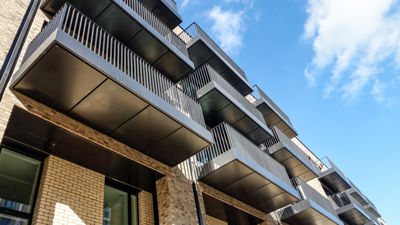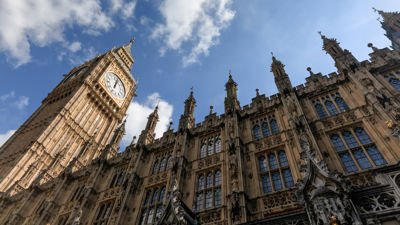The Government recently announced various support packages and price caps that will apply to your energy bills, whether you pay them yourself or through your service charge. The caps are different for domestic and commercial customers. If you enjoy a communal heating and hot water system, your energy will almost certainly be on a commercial contract – which have, until very recently, always been lower than the domestic rate. As the figures below demonstrate the commercial rate has now returned to being lower than the domestic rate thanks to Government intervention.
Government Support schemes
There are a number of schemes that have been put in place and the following link should be referred to regarding eligibility and applications:
Help with your energy bills - Help for Households
In summary as of 1st October 2022:
- Energy Bill Discount: £400 per eligible household, applied to bills in equal six-monthly instalments
- Cost of Living Payment: Households on means tested benefits - £650, in two instalments
- Disability Cost of Living Payments: £150 one-off payment
- Pensioner Cost of Living Payment - £300 one-off in addition to the Winter Fuel Payment
- Winter Fuel Payment – one-off £100-£300
- Cold weather Payments - £25 extra per week
- Warm Home Discount – one-off £150 rebate to electricity bills
All of the discounts and caps will be applied automatically by either your supplier or Government so if you are called up or emailed and asked to apply for a scheme, giving bank or credit card details, it will be a scam and you should not give out your information.
Energy Price Guarantee (EPG)
For flat residents with their own boiler and electricity supply the EPG domestic cap applies and is valid for 2 years from 1st October. The news has featured a figure of £2,500 – but this is just an example and represents an average across all types of households. In fact, the average consumption for flats is lower (£1,750 - £1,950) as flats tend to use less energy than houses. However, what you will end up paying will depend upon how much energy you use – so it is still worth looking at ways to reduce your energy consumption and some useful links and tips are given at the end of this article.
The link to the details on the EPG can be found here:
Energy bills support factsheet - GOV.UK (www.gov.uk)
And a useful summary here:
Energy price cap explained | Ofgem
For a customer with typical usage, paying by direct debit the caps are:
|
|
Energy Price Guarantee - From 1st October 2022 |
|
Electricity |
£0.34 per / kWh |
|
Gas |
£0.103 per / kWh |
Energy Bill Relief Scheme (EBRS)
For those of you with heating and / or hot water supplied from a communal system and charged via your service charge the commercial cap under the Energy Bill Relief Scheme (EBRS), valid for six months from 1st October, applies and details can be found here:
Energy Bill Relief Scheme: help for businesses and other non-domestic customers - GOV.UK (www.gov.uk)
|
|
Energy Price Guarantee - From 1st October 2022 |
|
Electricity |
£0.211 per / kWh |
|
Gas |
£0.075 per / kWh |
It is important to realise that your service charges are set in accordance with your lease, and your landlord / managing agent will have to set them based upon the situation at that time. If your budget has already been set and you have paid your demand, any savings under the price cap will be returned to you in your end of year balancing charge.
The current EBRS is only for six months, and hence the assumption in setting next years’ service charge demands will have to be that energy prices will rise sharply in April 2023 as the assistance comes to an end. Government and TPI are aware of how this will affect leaseholders and urgent consideration is being given to the matter.
Links to Useful Tips to Reduce Energy Consumption:
Thanks to Ofgem for the following (Ways to save energy and reduce your bills | Ofgem)
- Use a timer on your central heating system. Set the heating and hot water to come on only when required.
- If you have a hot water tank, set the cylinder thermostat to 60°C (140°F).
- Close your curtains at dusk to stop heat from escaping through the windows. Check for draughts too.
- Always turn off the light when you leave a room.
- Use energy-saving light bulbs.
- Don’t leave appliances on standby or laptops and mobile phones on charge unnecessarily.
- When washing up, washing or drying by machine, try to fully load the appliance. One full load uses less energy than two half loads.
- Try to only boil the water you need.
- Turn taps off properly. In a single week, a dripping hot tap can waste enough hot water to fill half a bath.
- Dry your clothes outside during nice weather.
Help on making your home heating more efficient:
Help Centre | The Heating Hub
Lower the flow temperature of your boiler to save 6-8% of gas bills
Save up to 8 percent on your gas bills with a lower flow temperature (theheatinghub.co.uk)
How to turn OFF the pre-heat on your Ideal combi boiler to save 5-10%
Turn off the preheat on your Ideal combi boiler (theheatinghub.co.uk)
How to balance your radiators to increase the efficiency of our radiators:
How to Balance Radiators: Step-by-Step Guide | Living by HomeServe
Place your appliances on standby or into Eco mode:
Should I use my TV in Eco mode? The pros and cons of energy-saving settings | What Hi-Fi? (whathifi.com)



